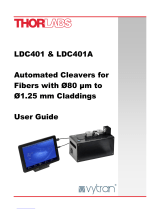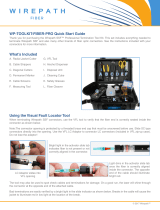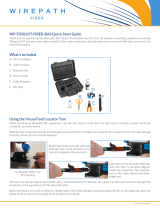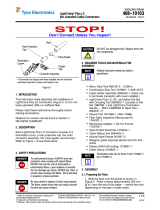Page is loading ...

OptiSaber®
Prizm®, MXC®
User & Maintenance Manual

2
Table of Contents
Welcome ....................................................................................................................................................... 4
Overview ....................................................................................................................................................... 4
Safety & Environmental Effects .................................................................................................................... 4
Safety ........................................................................................................................................................ 4
Safety Warning and Identification Labels ..................................................................................................... 4
Environmental Effects ............................................................................................................................... 6
Safety Systems & Radiation .......................................................................................................................... 6
Radiation Fields & Path ............................................................................................................................. 6
Levels of Radiation .................................................................................................................................... 6
Collateral Radiation ................................................................................................................................... 7
Protective Housing .................................................................................................................................... 7
Safety Interlocks ........................................................................................................................................ 7
Getting Started .............................................................................................................................................. 8
Unpacking & Setup.................................................................................................................................... 8
Parts & Functions .......................................................................................................................................... 9
Laser Operation ........................................................................................................................................... 13
Start-up Procedure .................................................................................................................................. 13
Operating the Laser ................................................................................................................................ 13
Cut Length Adjustments.......................................................................................................................... 13
Laser Shut Down ......................................................................................................................................... 14
Laser Maintenance ...................................................................................................................................... 15
Daily or More Often as Required ............................................................................................................ 15
Monthly ................................................................................................................................................... 16
Troubleshooting .......................................................................................................................................... 17
Over Temperature .................................................................................................................................. 17
Service & Support ....................................................................................................................................... 18
Technical Specifications .......................................................................................................................... 18
CE Notice (European Union) ................................................................................................................... 18
Company Information ................................................................................................................................. 19
LIMITED WARRANTY ................................................................................................................................... 20

3
Printing History
June 2018
© Copyright 2018 by Domaille Engineering, LLC
© Copyright 2015 OpTek, Ltd 2015

4
Welcome
Congratulations on selecting the OptiSaber® OS7500P, designed for the laser cleaving of optical fibers
being terminated in a PRIZM® LT or PRIZM® MT ferrule.
This User’s Guide will assist you in the setup, operation and maintenance of the OS7500P laser cleaver
to maximize the use and life of the equipment.
Overview
The OptiSaber® Laser Cleaving System is designed to address the need to efficiently cleave optical fibers
for the production of PRIZM® Light Turn & MXC® connectors.
The OptiSaber® OS7500P allows you to laser cleave up to four rows of 8, 12 or 16 fiber ribbons in one
load without the need to remove for repositioning the different rows. The OS7500P was rigorously
tested at US Conec and approved to meet their PRIZM® Laser Cleave Quality Guidelines, US Conec Doc#
AEN-1919. The OS7500P is fast and accurate while saving critical floor space. Operators can initiate the
cleave cycle by using a hand or foot switch for easy activation.
The patent pending PRIZM® adapter allows for accurate positioning of the optical fiber ribbon. The
OptiSaber® includes a removable thumbwheel to set cleave length in increments of approximately 10
microns for accurate cleaving.
Safety & Environmental Effects
Safety
Laser Safety
The machine operates as a Class 1 (i.e. inherently safe) laser product system. Although, incorporating a
Class 4 laser the machine is rendered inherently safe by the whole system design that is protected by
access restrictions and mechanical interlocks. It is built to meet requirements of 21 CFR 1040. 10 and EN
60825-1 provided safety interlocks are not defeated.
Under no circumstances should the machine be operated with safety interlocks over-ridden
unless under the supervision of a responsible person suitably qualified in laser safety.
The warning signs that are used on the system are shown in the Safety Warning labels section of this
User’s Guide.
Safety Warning and Identification Labels
The OptiSaber® is a Class 1 laser system but incorporates a Class 4 laser from which the user is protected
by a light-tight protective housing.

5
Mechanical Safety
There are no user accessible moving parts.
Under no circumstances should the machine be operated with safety interlocks over-ridden
unless under the supervision of a responsible person suitably qualified in laser safety.
The machine includes low power moving parts required for scanning the laser beam during processing.
These parts are located within the protective housing and therefore not accessible during normal
operations.
Electrical Safety
The machine complies with all relevant USA, UK, and European electrical safety standards. All external
panels require a tool for removal. Main voltage components are further shielded once external panels
are removed. There are no High Voltage circuits accessible in the laser unit protective housing. The
machine is fully EMC tested and certified. This includes testing at light industrial levels for emissions, and
at industrial levels for susceptibility.
Fume & Extract
Laser processing of materials generates fine dust and vapor particles. The nature, composition, and
volume of these debris will be dependent on the material being processed and the laser parameters
being used. The machine is intended for processing silica associated with fiber optical connectors, but
Domaille does not have control over what materials are introduced into the laser unit. Consequently,
Domaille cannot take responsibility for the fumes and particulates produced. It is the responsibility of
the customer to ensure that adequate measures are taken to ensure the safe handling of fumes and
particulates. To comply with safety regulations the extraction unit used with the machine must be
operating correctly and connected with the supplied flexible hose to the extract hose connection.
The machine should not be operated without a suitable and correctly functioning extract
unit attached. It is the responsibility of the user to ensure that the extracted fumes and
debris are handled safely and responsibly, and that the suitable safety documentation is
prepared in accordance with local legislation and regulations.
Domaille takes no responsibility for the collection or treatment of the processing fumes, or for the
subsequent exhaust of the processed fumes. Domaille shall not be responsible for damage or failure due

6
to build-up of contamination caused by inadequate extraction or operation without a correctly
operating extract unit.
Environmental Effects
It is Domaille’s policy to produce machines that have a positive overall environmental effect. In the case
of the OptiSaber®, positive effects will result from subsequent improvements in performance and yield
of the ultimate fiber optical product that this laser unit will allow. Negative environmental effects could
result from machining of hazardous or toxic materials and it is strongly recommended that the user
ensure that the handling of any process by-products be controlled to minimize any negative effect on
the environment as a whole.
Connection to Utilities & Environment
The laser unit is designed to operate in a clean environment, free from substantial sources of vibration
and shock.
Safety Systems & Radiation
This section covers the specific safety systems incorporated into this laser unit that are designed to
protect the user from harmful radiation. This radiation, its paths and levels of intensity are described in
detail along with all protective housings and interlock devices.
There is no human access to laser radiation during normal operation or maintenance of the
machine.
Radiation Fields & Path
Protective housings and interlocks completely cover and protect humans from the laser beam in normal
operation and maintenance. The beams are only accessible with the covers removed and/or the
interlocks defeated. No beam attenuators or scanners are present.
Levels of Radiation
The laser sources are described in Table 1 below. The beam described is only accessible with the covers
open while servicing the machine.
Parameter
CO2 Laser (IR)
Wavelength
10.55-10.63um
Average Power
<50W
Output Power Stability
<5%
Operating Frequency & Duty Cycle
0-25kHz & 0-100%
The parameters listed in Table 1 are the maximum values that are possible for the laser to produce,
even under fault conditions.
Table 1

7
Collateral Radiation
Collateral radiation generated by the process is minimized to very safe levels. Significant collateral
radiation is not normally produced from this machine during operation or maintenance. Measurements
of collateral radiation are described below. The interlocked protective housing meets Class 1 laser safety
standards. It was constructed light-tight with material which is opaque to the laser radiation and capable
of withstanding this radiation for an indefinite period.
In operation: No collateral radiation is present in normal operation. If the laser is triggered
when there is no connector in the tooling to be cleaved, the maximum collateral radiation
measured at the loading port is six times below the MPE/AEL limit.
In maintenance: No collateral radiation is present.
Protective Housing
The protective housing is an integral part of the laser unit and its operation, serving to prevent
unnecessary human access to laser radiation.
The housing completely protects the user from laser beam access. There are no user serviceable parts in
this machine.
Safety Interlocks
Mechanical safety interlocks are an integral part of the machine design. They have been installed in the
appropriate places to ensure that no human access to the laser beam is possible during operation and
maintenance.

8
Getting Started
Unpacking & Setup
NOTE: Your OptiSaber® Laser will arrive in a shipping case while the Extract Unit and accessories will ship
in a separate box.
1. Remove all loose components from the shipping case.
2. Carefully lift OptiSaber® and Power Supply out of the shipping case on to a robust surface.
Remove the plastic bag from around the laser unit.
3. Remove Extract Unit and accessories from the second shipping box.
4. Inspect the laser cleaver for any damage that may have occurred in shipping.
5. Start the setup by connecting Extraction Hose to top of Extract Unit by pushing firmly into
fitting.
6. Assemble other end of the hose to the back of OptiSaber®. Position hose clamp no more than
½” from end of hose. Using a slotted screwdriver, tighten hose clamp screw.
7. Attach Activation Switch cable to the port labeled “Switch” located near the back of laser
cleaver.
8. Optional monitor may be connected to the port labeled “Monitor”. The monitor will be located in
the bottom of the OptiSaber® shipping case.
9. Connect each power cord into the Extract Unit and Power Supply.
10. Lastly, plug the other end of each power cord into the appropriate outlet (110/240 volt).
To use the Cyclone Separator, follow these steps.
1. Cut 2 feet (61cm) off of the extract hose.
2. Screw on hose cuffs to both cut ends of extract
hose. (Hose Cuffs are located inside the Cyclone)
3. Connect the 2 foot hose to the Extract Unit and
to the top of the Cyclone Separator.
4. Connect the other hose to the back of the
Cyclone and the OptiSaber®.
5. You can place the handle of the Cyclone
Separator underneath the latch of the Extract
Unit lid to help stabilize the Cyclone.

9
Parts & Functions
2
10
7
8
9
6
4
5
1
3

10
Laser Unit
OS7500P laser unit
PRIZM® Adapter
Easily positions multiple rows of optical fiber
Height Adjustment Knob
Adjusts cleave length between fiber rows
Thumbwheel
Allows for adjustment of cleave length
Access Door
Allows access to cleaning bottom of adapter
Locking Screw
Tighten or loosen to adjust thumbwheel
Ready Lights
Alerts operator when laser is ready
Power Supply
Hardwired to laser
Extract Unit
Necessary for operation, removes shards, fumes and keeps laser unit cool
Monitor
OPTIONAL monitor to provide visual support while laser cleaving
1
4
5
6
7
8
9
3
2
10

11
Adapter Slide
Positions the ribbon fibers for cleaving.
Adapter Slide Positions
Locates the Adapter Slide for the different cleaving positions.
Clamp
Cam Clamp holds 16mm wide ribbon holders in the adapter. Has
a replaceable rubber ring.
Adapter Slide Lock Pin
Locks the Adapter Slide in the different slide positions. If only
cleaving one row, this can be removed when in the lock position
using a small coin.
Clamp Lever
Press the lever in to raise the clamp and rotate to actuate.
5
4
1
2
3
5
1
2
4
3
5

12
Trigger Switch Connection
Foot or hand switch available, initiates
cut cycle
Power Cord
Power cord hard wired o the power
supply provides electricity from power
supply to laser unit
BNC Output
BNC output port for OPTIONAL
monitor
Extract Unit Hose Output
Connection between laser unit and
extract hose
Air Filter
Keeps air particles from entering laser
1
1
2
5
4
3
2
3
4
5

13
Laser Operation
Start-up Procedure
Due to a small amount of laser output on startup it is recommended that no fibers are loaded
in the OptiSaber® at this point.
IMPORTANT: an extract unit must always be connected and working when the module is in use. Failure
to do so will void the warranty.
1. The fume extract unit must be turned on using the green button on unit.
2. To start the laser unit, connect the power cord to the power outlet. If your power
cord is equipped with a yellow GFCI plug, you MUST push the reset button on the
plug to supply power to the machine.
3. Turn on the switch on the power supply module.
4. If monitor is being used, plug into power outlet and turn on.
Operating the Laser
To begin operations, set dial on Extract Unit between 75% -100%
based on ambient temperature.
When the machine has been switched on all cycle lights illuminate,
then the fault and laser emission LEDs will flash blue and white
respectively as the laser warms up. A single Green LED on the top panel will indicate that the unit is
ready.
Refer to Domaille Document Number OS7500P-PLT for instructions to prepare, load & cleave
ribbonized fiber for US Conec Prizm® Light Turn Connectors.
Refer to Domaille Document Number OS7500P-PMT for instructions to prepare load & cleave
ribbonized fiber for US Conec Prizm® MXC Connectors.
Cut Length Adjustments
The OptiSaber® comes pre-set with a cleave length of approximately 5.7mm from a standard ribbon
holder, each line graduation on the thumbwheel represents an approximate 10µm adjustment.
Adjusting this length can be done in a few simple steps.
1. Loosen the locking screw which is located directly above the thumbwheel.
2. Rotate thumbwheel to achieve desired cleave length. Turning to the left will shorten the fiber
length, to achieve a longer cut length, rotate the adjustment wheel to the right.
3. Tighten locking screw to secure thumbwheel.

14
Each OptiSaber® OS7500P has a Home Position and a Cut Range recorded on the back of the machine.
Operating outside of the Cut Range could result in damage to adjacent rows of fibers if set too high
when cutting multiple rows or blocking the beam path causing fibers to not to be cleaved if set too low.
Follow these steps to get the machine back in the Cut Range:
1. Place the Height Adjustment Knob in the “A” position.
2. Loosen the locking screw, located directly above the thumbwheel.
3. Rotate thumbwheel to the right until it contacts the stop. This is the “Home Position” and the
position on the thumbwheel should match the position recorded on the back of the machine case.
4. The first position recorded on the Cut Range is the Upper Limit or the longest possible cleave.
Rotate the thumbwheel to the left by the number of full turns recorded on the tag and continue
turning to the letter. ( i.e. rotate left 1 turn to F)
5. The second position is the Lower Limit or the shortest possible cleave. Rotate the thumbwheel
to the left by the number of full turns recorded on the tag from the Home Position (not located
from the Upper Limit position) and continue turning to the letter. ( i.e. rotate left 2 turns to P)
Laser Shut Down
The following procedure should be used to shut down the OptiSaber® OS7500P.
1. Turn off power supply module switch.
2. Using green button, turn off extraction unit.
3. For additional security, unplug electrical cords from power outlets.
Always ensure that any hazard has been removed before the machine is
restarted. Staff of a suitable level of responsibility and training should be
involved in the decision to restart following emergency shutdown.

15
Laser Maintenance
Proper care and handling of the laser unit, power supply, and extract unit is critical to maintaining
efficient operation. If the laser unit or components are damaged in any way, contact Domaille
Engineering.
There are no serviceable parts inside the laser unit. Do not remove sealed screws. Evidence of
tampering will void warranty.
Daily or More Often as Required
1. Ensure correct operation of the extract and cooling system.
2. Ensure fans on laser, power supply, and extract unit remain unobstructed.
3. Check Extraction Unit filter. If cleaning or change is needed, follow instructions in Extract
Unit manual.
4. Clean Adapter Unit as needed following instructions below.
Cleaning Adapter Unit
Before any maintenance is to be performed, the OptiSaber® must be properly powered down and
unplugged from all power sources.
1. Throughout the day, clean the top side of the adapter by
inserting the cleaning brush to clear debris from inside
adapter.
2. Occasionally, the bottom of the adapter will need to be
cleaned. There is a door on the front of the OptiSaber® to
enable cleaning bottom of the adapter. When the door is
open, there is a physical block to prevent laser radiation
from exiting the machine.
Step 1: Remove the screw for the cleaning door using a 2.5mm Allen wrench

16
Step 2: Pull out and rotate the door clockwise to open
Step 3: Clean the bottom of the adapter with the supplied angled cleaning brush. Replacement brushes
can be ordered from Domaille Engineering, please contact customer service.
Monthly
Inspect fan filters on the back of the laser, power supply, and extract unit. Vacuum to clean or
remove and clean with compressed air.

17
Troubleshooting
A red warning light indicates an operating fault in the laser unit. The user should follow the
standard shut down procedure (page 15) to power off the OptiSaber® and contact Domaille
Engineering to report the fault.
Repeating Fault
Beep
Explanation
Remedy
1 short
One or both of the two cover switches
is open
Check cleaning access door to ensure it is
closed
2 short
Laser internal temperature is above
50°C (122°F) or laser error
Refer to over temperature section (p. 17)
3 short
Scanner plate is above 50°C (122°F)
Refer to over temperature section (p. 17)
4 short
Air Temperature inside the laser unit is
above 50°C (122°F)
Refer to over temperature section (p. 17)
5 short
Laser voltage error feedback from
laser
Contact Domaille
1 long, 1 short
Start Button Fault
Start button may be stuck, check switch
operation
2 long, 1 short
Laser Not Ready
Restart Laser
2 long, 2 short
Opto-sensor not broken by scan arm
Restart laser; Contact Domaille
Over Temperature
The laser can go over temperature when the ambient temperature is above 86°F (30°C). Follow
shut-down procedure to allow the laser unit to cool (page 15).
Ensure the vacuum hose seal is tight and properly extracting the warm air from the laser. Increase
extraction unit power to 100%.

18
Service & Support
Technical Specifications
Laser Height:
6.6 inches (170 mm)
Laser Width:
8.9 inches (225 mm)
Laser Depth:
21.2 inches (538 mm)
Extract Unit Size:
12.1x11.6x14.4 inches (308x294x366 mm) (LxWxH)
Extract Unit Weight:
37.5 lbs (17 kg)
Power Supply Size:
14.4 x 5 x 3.5 inches (360x127x89mm) (LxWxH)
Power Requirements for Laser:
Single Phase, 110-240VAC, 50/60Hz
Power Requirements for Extract Unit:
110-240VAC, 50/60Hz
Laser Cooling:
Air Cooled
Extract Unit Capacity:
Approx. 1 Million Shards
Machine Weight:
33 lbs (15 kg)
Shipping Weights, Laser Unit & Extract Unit:
70 lbs (32 kg) & 40 lbs (19 kg)
Typical Process Time:
3-4 seconds
Temperature Range:
41°F-86°F (5°C-30°C)
Maximum Altitude
6500 feet above sea level (1828M)
Maximum Humidity
20-85% non-condensing
Noise Emission level
Less than 55.0dBA Extract unit measurement at 100%
In the event of malfunction, or when other maintenance is required beyond the steps documented in
this manual, service must be done by a qualified Domaille Engineering technician. There are no user
serviceable parts inside the case. Do not remove sealed screws. Evidence of tampering will void
warranty. For assistance, contact Domaille Engineering, LLC USA.
Both USA and European Standard power cords sets are available from Domaille Engineering, LLC. Please
contact our office if an additional set is needed.
CE Notice (European Union)
Marking by the symbol CE indicates compliance of the OS7500P to the following directives of the
European Union:
BS EN 61326:2006 Electrical equipment for measurement, control and laboratory use. EMC
requirements. General requirements.
BS EN 60204-1:1998 Safety of machinery-Electrical equipment of machines Part 1. (Complying with the
Low voltage directive 2006/95/EC).
BS EN 61010-1:2001 Safety requirements for electrical equipment for measurement, control and
laboratory use. General requirements.
BS EN 60825-1:2007 Safety of laser products.
Year of CE Marking: 2015
EU representative:
OpTek,
12-14 Blacklands Way, Abingdon Business Park, Oxford, OX14 1DY, UK

19
Company Information
Domaille Engineering’s mission is to provide our customer with the highest quality
solution through the innovative use of technology that allows our customers to
gain a competitive edge. Our core competencies in engineering and precision
manufacturing provide OEM’s and fiber optic customers effective and cost
efficient solutions.
From our world renowned APM-HDC-5300 polishing machine to our patented MT
EZ AbraSave® fixtures, Domaille Engineering equipment provides the highest
yields and throughput in the fiber optic industry.
The Domaille APM-HDC-5300 interface allows user to program a soft ramp of
pressure and speed. This feature along with accurate force, speed, and time
enables customers to consistently meet the most demanding fiber optic polishing
specifications.
Our patented AbraSave® fixture line utilizes Unique Path Technology which
reduces polishing time and polishing film costs. The AbraSave® technology
delivers the most consistent fiber protrusion for the best polishing results in the
fiber optic industry.
The OptiSaber® laser cleaver is a Domaille solution addressing process variation
associated with cracking typical of mechanical cleaving process. Our patented MT
adapter allows users to cleave both UPC and APC ferrules with a couple simple
adjustments.
Domaille Engineering proudly offers our OptiSpec® product line of fiber optic
microscopes. Our OptiSpec® microscope line offers customers high quality
production fiber optic inspection capabilities for both production and laboratory
settings.
View all of our products, including the Universal Cure Oven and Air Cleanse
System, at www.DomailleEngineering.com.

20
LIMITED WARRANTY
Domaille Engineering, LLC (“Domaille”) products are warranted by Domaille to be free from defects in
workmanship and materials for a period of one-year from the original purchase date. This warranty
covers defects in materials or workmanship only and does not include damage due to abuse, misuse,
problems with electrical power, problems with compressed air supply, servicing not authorized by
Domaille, failure to properly care for and maintain the products, or normal wear and tear. In addition,
use of parts, components, or accessories not supplied or approved by Domaille will void this warranty.
Domaille’s sole liability arising from any use of its products and this warranty is limited to repair or, at
Domaille's sole discretion, replacement of defective products or defective component parts thereof. To
request warranty service, you must contact Domaille at 7100 Dresser Dr. N.E., Rochester, MN 55906,
USA. If warranty service is required, Domaille will issue a Return Material Authorization Number (RMA#).
You must ship the products back to Domaille in their original or equivalent packaging, pre-pay shipping
charges, and insure the shipment or accept the risk of loss or damage during shipment. Along with your
RMA # include your name, telephone number, return address, proof of original purchase date, and a
description of the claimed defect. If the defect is covered by this limited warranty, Domaille will repair
or replace (at its option) the product or the defective component part(s) and ship them freight prepaid
to an address in the continental U.S. Shipments to locations outside of the U.S. that are not the original
shipped to location will be made freight collect or will be shipped to the original shipped to location, at
the discretion of Domaille.
NO WARRANTY OTHER THAN THE ABOVE LIMITED WARRANTY IS MADE, EITHER EXPRESS OR IMPLIED.
ALL EXPRESS AND IMPLIED WARRANTIES FOR THE PRODUCT, INCLUDING BUT NOT LIMITED TO ANY
IMPLIED WAR- RANTIES OF MERCHANTABILITY AND FITNESS FOR A PARTICULAR PURPOSE, ARE LIMITED
IN DURATION TO THE ONE YEAR LIMITED WARRANTY PE- RIOD. DOMAILLE SHALL HAVE NO LIABILITY
FOR ANY INCIDENTAL OR CONSEQUENTIAL DAMAGES RELATING TO ITS PRODUCTS.
SOME STATES (OR JURISDICTIONS) DO NOT ALLOW LIMITATIONS ON THE DURATION OF IMPLIED
WARRANTIES, OR EXCLUSION OR LIMITATION OF INCIDENTAL OR CONSEQUENTIAL DAMAGES FOR
CERTAIN PURCHASERS, SO THE ABOVE LIMITATIONS OR EXCLUSIONS MAY NOT APPLY TO YOU. THIS
LIMITED WARRANTY GIVES YOU SPECIFIC LEGAL RIGHTS, AND YOU MAY ALSO HAVE OTHER RIGHTS
WHICH VARY FROM STATE TO STATE (OR JURISDICTION TO JURISDICTION).
/





